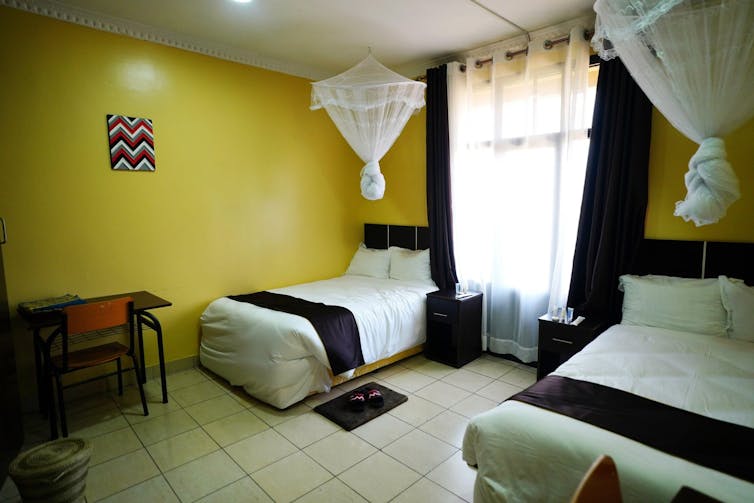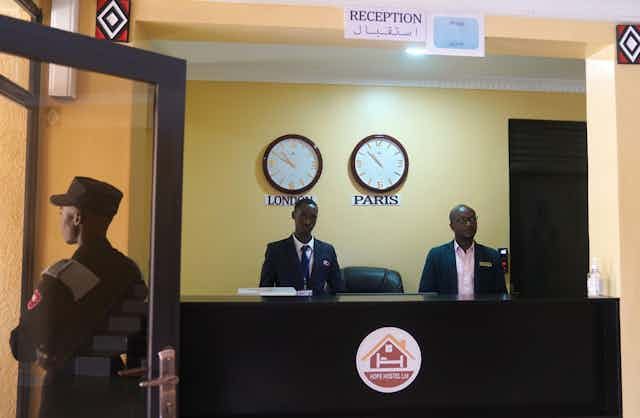The Home Office has revealed how much it believes it will cost to send migrants arriving in the UK to Rwanda – a staggering £169,000 per person. This estimate is even more surprising when you consider that one of the aims of the government’s migration policy is to stop spending billions of pounds on housing refugees in the UK.
Although the Court of Appeal has ruled the government cannot legally proceed with its plan to send deported migrants to Rwanda, the prime minister, Rishi Sunak, has already said the government will appeal it in the supreme court.
The government has arrived at this £169,000 number from five separate calculations. Each of these is itself wildly uncertain and, as the government’s own assessment notes, does not include a wide range of other costs that are sure to emerge. That implies that the true cost per head is likely to be even higher.
£105,000 for ‘third country costs’
The largest component of the £169,000 is £105,000 for “third country costs”. This is the amount the government believes it will have to pay to cover the costs incurred by a third country like Rwanda to host a refugee if they cannot be returned to their home country.
The calculation is based on a National Audit Office estimate of the cost of hosting Syrian refugees in the UK. This was published in 2016, at the beginning of the programme to take in Syrian refugees and so is itself a forward-looking estimate. The NAO itself recognised that the actual cost was “uncertain”.
To reach £105,000, the government has taken the estimated average cost per refugee coming to the UK in 2016 (£17,340), multiplied it by five and transformed it into 2023 costs. This was based on the Syrian resettlement scheme lasting five years – but there is no explanation as to why they assume someone deported from the UK would need support for that period.

A presumably more accurate estimate of these costs has recently been agreed in the partnership signed with Rwanda but the government has not published this figure, deeming it “commercially sensitive”. Publishing a figure that the UK will use in all future agreements (still to be negotiated) will result in this being used as a minimum starting point by any other third-country negotiators.
Other costs
“Flight and escorting costs” are estimated at £22,000 per person. This is based on an “uncertain assumption” that 50 people will be deported per flight, which is extremely optimistic. In 2022, an average of 25 people were on each deportation flight out of the UK and most of these were to European destinations, which are easier logistically and cheaper than other third countries outside of Europe. And that only includes flights that took off.
Another element of the calculation is “Home Office resource costs”, estimated at £18,000. This is probably the most accurate component of the cost estimate, since it is based on current average legal costs of appeals. Still, this figure does not include costs to retrain Home Office officials or related capital costs for things such as building new detention centres.
The final two costs are more problematic. The figure of £7,000 for detention assumes 40 days between arrival and deportation. The inaccuracy of this figure may be judged by the 374 days that the passengers on the inaugural flight to Rwanda have spent in detention between June 14 2022, when the flight was cancelled, and the judgment on June 29 2023 that Rwanda deportations cannot go ahead.
Finally, £1,000 for “Ministry of Justice costs” includes only the costs of legal aid, not all of the other costs incurred by the Ministry of Justice to hold legal proceedings.
The final hole in these calculations comes from the recognition that this cost is only for those who are successfully deported and does not include those who, for whatever reason, remain in the UK.
Pricing an unworkable policy
Usually, economic impact assessments lay out the financial cost of legislation as a whole. So it’s notable that we’re now getting a “cost per head” of the proposed policy.
But the most surprising element of the impact assessment of this policy, as immigration expert Lucy Mayblin has pointed out, is the Home Office’s frank admission that it has no idea how the bill will work once it becomes law.
The document itself states that this is “a novel and untested scheme, and it is therefore uncertain what level of deterrence impact it will have”.
In other words, the government does not know if people will stop trying to enter the UK if they know they could be deported to Rwanda or another third country on arrival. That uncertainty around how many people are implicated makes it impossible to calculate a total cost. And given the limited success of deterrence tactics so far, it seems entirely plausible that the eventual cost will be much higher.

